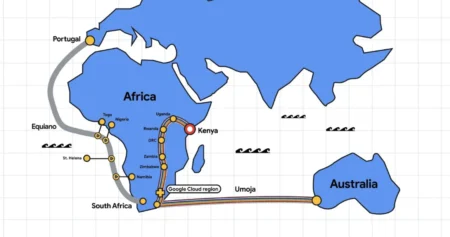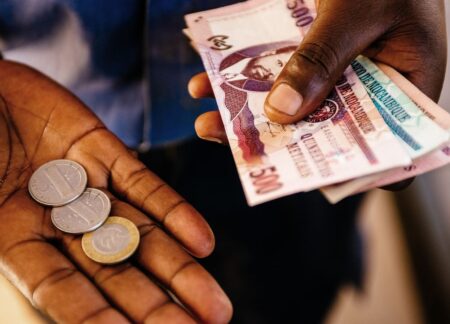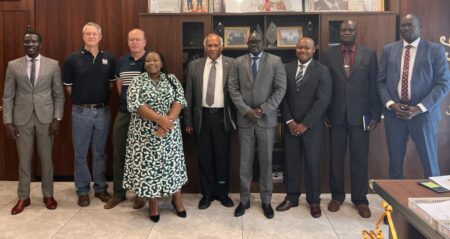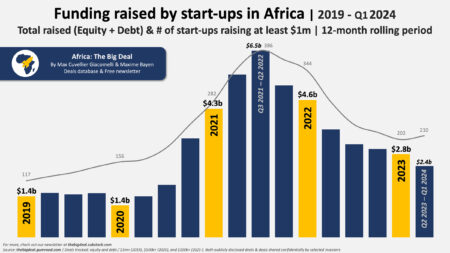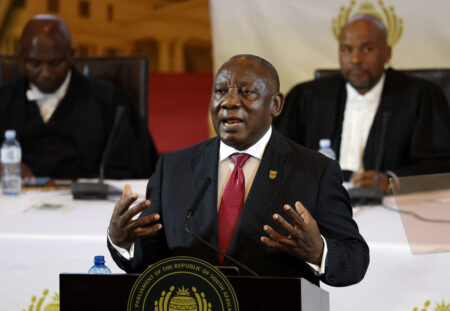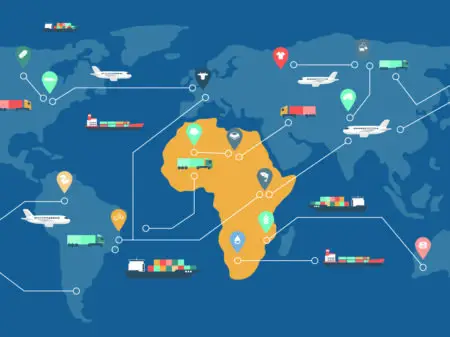- Africa’s new dawn: the rising role of digital and AI in agriculture
- Can Dangote Refinery Transform Africa Energy Ambition
- Gallup Survey: 80 per cent of Kenyan Workers Are Disengaged and Seek New Opportunities
- Madagascar Man Freed from 5KG Tumor After 15-Year Struggle
- How women in Africa are perceived and treated
- Sugar consumption in Kenya to Increase to 1.23 Million Tonnes
- Can Somalia and Turkey Oil deal Bring Change in Somaliland
- Remittances to Kenya dropped to $371.6 million in June, marking a six month low
Browsing: South Africa
- AI in agriculture is being used to drive the sourcing of real-time data, perform predictive analysis, and run algorithms that optimize farming practices.
- In South Africa, Kenya, and Zimbabwe, ITIKI, an innovative project is tapping indigenous environmental knowledge among African communities, integrating it with AI to predict droughts with better precision.
- GSMA: AI in agriculture is poised to enable the deployment of innovative digital financial solutions such as credit and insurance products for millions of farmers.
In Africa, a continent of over 1.2 billion people, agriculture remains the primary economic activity, accounting for 17 percent of the GDP on average while offering jobs to nearly 60 percent of the population.
The bulk of the food produced in Africa or about 80 percent is, however, attributable to the effort of smallholder farms, where women provide much of the workforce. Unfortunately, these smallholder farmers continue to face multiple challenges, a scenario that …
- Google is rolling out Umoja cable, the first-ever fibre optic link directly connecting Africa with Australia, aiming to enhance global digital infrastructure and foster economic growth.
- The Umoja project, developed in collaboration with Liquid Technologies, will improve connectivity and drive digital inclusion across Africa.
- This initiative is part of Google’s long-term commitment to Africa’s digital transformation, with investments in infrastructure, cybersecurity, and AI innovation to support growth.
In a deal set to revolutionize digital connectivity across continents, tech heavyweight Google has announced the launch of Umoja, the first-ever fibre optic link directly connecting Africa with Australia. This project is poised to enhance global digital infrastructure, foster economic growth, and drive digital inclusion on a new level scale.
The Umoja cable, anchored in Kenya, will traverse a diverse array of African countries, including Uganda, Rwanda, the Democratic Republic of Congo, Zambia, Zimbabwe, and South Africa, before crossing the Indian Ocean …
- Africa private capital deals fell to to 450 deals in the past one year.
- The continent’s total private capital deal value stood at $5.9 billion, the fourth largest value on record since 2012.
- Decline in Africa private capital deals marked the continent’s steepest year-over-year decline in volume in 12 years.
Africa recorded a 28 per cent year-over-year (YoY) decline in the total private capital deal volume for the first time since 2016, falling to 450 deals. This downturn is attributed to the global economic turmoil, which led to inflation spikes and the devaluation of continental currencies.
In Kenya and Nigeria for instance, the Shilling and the Naira plunged to historic lows in 2023, while in Egypt, a shortage in foreign currency led to increased controls over its usage in the country.
According to the 2023 African Private Capital Activity Report, the depreciation of local currencies and the depletion of foreign …
- South Africa’s Strategic Fuel Fund (SSF) operates Block B2 in South Sudan in collaboration with Nilepet.
- The company has just completed a major phase of its oil and gas exploration in Jonglei state.
- SSF recently completed undertaking the largest geophysical survey ever done in South Sudan, covering 47,000 square kilometres.
In a move marking the strengthening bilateral relations between South Africa and South Sudan, the Strategic Fuel Fund (SFF), South Africa’s state-owned petroleum company, convened a key meeting with South Sudan’s national oil company, Nilepet, in Juba last week.
The meeting was a highlight of South African President Cyril Ramaphosa’s state visit, underscoring the growing economic ties between the two nations.
The SFF, which operates Block B2 in South Sudan and collaborates with Nilepet through the Nile Orange joint venture, has recently completed a major phase of its oil and gas exploration campaign in Jonglei state. The initial aerial survey …
- 121 African startups secured $466M, marking a 27 per cent drop from the previous quarter; women-led startups got 6.5 per cent of the capital.
- About 87 per cent of startup funding in the three months to March went to entities in Nigeria, Kenya, Egypt, and South Africa.
- Gender imbalance persists as only 6.5 per cent of the financing went to female-led startups in Africa.
The big four economies of Nigeria, South Africa, Kenya, and Egypt continue to attract the highest share of funding going to startups in Africa, even as the ecosystem suffered a 27 per cent drop in financing to $466 million in the three months to March 2024.
The latest analysis from Africa: The Big Deal shows that 87 per cent of startup funding in the three months to March went to upcoming entities in Nigeria, Kenya, Egypt and South Africa.
Attracting $160 million, Nigeria’s economy accounted for …
- The United Nations declared the years 2021 to 2030 as the “Decade of Healthy Ageing”.
- With increased longevity in Africa, it is imperative to focus on research, policy and infrastructure development to properly support ageing population.
- A greater effort is required to implement the AU Policy on Ageing and the Protocol on Human Rights for Older Persons in the contexts of (South) Africa.
While Africa is a continent with a rapidly growing population of young people, it is crucial for the region to pay attention to the global agenda on ageing.
The United Nations declared the years 2021 to 2030 as the “Decade of Healthy Ageing”. This global collaboration, aligned with the last 10 years of the Sustainable Development Goals, seeks to improve the lives of older people, their families and the communities in which they live.
“With increased longevity in Africa, it is imperative to focus on research, policy …
- The energy crisis in South Africa has significantly impacted the nation’s economic growth, potentially reducing it by up to 3.2 percentage points in 2022.
- President Cyril Ramaphosa declares that the end of load shedding in South Africa is “finally within reach.”
- This president’s assertion is a ray of hope for millions of citizens who have endured the disruptive effects of load shedding for far too long.
South Africa has long grappled with the scourge of load shedding, a term that has become synonymous with power cuts and energy instability.
However, this week, President Cyril Ramaphosa during his 2024 State of the Nation Address (SONA) sparked optimism across the continent’s most advanced economy, suggesting that an end to frequent load shedding may finally be within reach.
President Ramaphosa’s Optimistic Proclamation
During his SONA in Cape Town, President Ramaphosa expressed confidence that South Africa is on the brink of overcoming its …
- The threat of SIM swap fraud looms large over South Africa’s telecommunications landscape.
- Strengthening identity verification practices is paramount to safeguarding consumers and preserving trust in the digital ecosystem.
- Operators need to define practical, robust security solutions that adhere to and surpass current telco legislation.
In today’s digital age, where mobile phones have become an indispensable part of everyday life, the threat of SIM swap fraud looms large over South Africa’s telecommunications landscape.
Gur Geva, founder and CEO of face authentication and identity verification platform , iiDENTIFii, underscores the critical importance for mobile networks to prioritize customer protection and combat this pervasive menace.
“While there has been a slight decline in reported SIM swap fraud cases, mobile service providers must remain vigilant and bolster their data security measures,” asserts Geva.
Despite strides in mitigating fraud, fraudsters continue to exploit vulnerabilities in identity verification processes, underscoring the imperative for enhanced …
- Africa’s economic growth in 2024 is expected to be upward with the real GDP projected to grow by 3.2 per cent, up from 2.6 per cent in 2023.
- East Africa, encompassing Ethiopia, Kenya, Uganda, Rwanda, Tanzania, and the DRC, will again power the continent’s growth prospects.
- Despite the projected continental growth, the intelligence unit faces substantial risks, including security threats, political instability, and debt repayment burdens.
Africa’s economic growth 2024
According to the international research unit, Economic Intelligence, Africa is expected to grow at the second-fastest rate among major regions globally in 2024. The unit ranks behind Asia, which China and India will propel.
Except for Sudan and Equatorial Guinea, whose economies appear destined to decline this year, most African governments are predicted to report good growth stories.
The real African GDP is expected to rise by 3.2 per cent in 2024, up from 2.6 per cent in 2023, …
- International Finance Corporation targets specific projects in Côte d’Ivoire, Egypt, Kenya, Morocco, Senegal, and South Africa.
- IFC’s $30 million (Sh4.8 billion), own-account investment will help Africa Infrastructure Investment Fund 4 Partnership (AIIF4) exceed its final close target of $500 million (Sh80.4 billion).
- A pan-African infrastructure private equity firm called the Africa50 Infrastructure Acceleration firm I is raising up to $500 million for investments
Kenya is among six African countries that International Finance Corporation (IFC) will pump $30 million (about KSh4.8 billion) equity investment to fund works on essential infrastructure.
The fund, managed by Africa Infrastructure Investment Managers (AIIM), part of the Old Mutual Group, will support projects in the telecoms, renewable energy, and transport sectors across Africa but with a specific focus on Côte d’Ivoire, Egypt, Kenya, Morocco, Senegal, and South Africa.
In the telecoms sector, the fund will focus on financing data centers, fiber networks, and communications towers. In …






